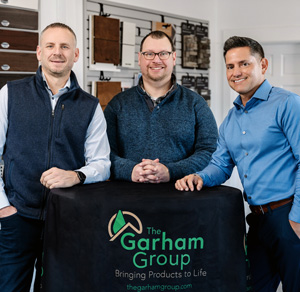The three partners of The Garham Group have been able to achieve their goals of successfully creating and growing a business all their own while “Bringing Products to Life.” As stated on the agency’s website (www.garhamgroup.com), the products they “bring to life” reside primarily in their customers’ backyards.
Anthony Zasuwa, one of the agency’s three partners, states: “We specialize in exterior building and outdoor living materials. These include decking, railing, cladding, foundation, and hardscape products. During the last five years, there’s been a real emphasis on backyard spaces. As an agency, we focus on selling innovative products that last a lifetime.”
Located in West Michigan, just outside Grand Rapids, the agency, established in 2015, represents principals in the building materials and outdoor living industries. Garham currently provides more than $25 million in sales annually for the principals that it represents. In addition to Zasuwa, the agency’s partners are Joel Garcia and Kasey Hamilton. Garham fields six reps, along with some inside sales and marketing associates.
Zasuwa explains that the three partners got together shortly after he left his position with a national landscape supply company. “At that time, I was working with one of my current partners who was a rep for a few of the products I was purchasing. We were involved in ongoing projects that he encouraged me to move forward with. Shortly after that I realized the potential and came on board with the agency.”
Expanding Travel
In addition to the earning potential, Zasuwa was also attracted to some of the other benefits being a rep provides. “I think the opportunity to experience new cities, meet other industry professionals and build relationships outside Michigan was appetizing to all of us. Furthermore, we all find it very rewarding to develop an idea or a small business from the ground up into something viable.”
Zasuwa maintains that a contribution to the agency’s early and continued success was that at the beginning, “We were able to work with a mentor who had recently retired from the building industry. He provided us with a tutorial about working in the rep business. In addition, he had connections in the industry. He was gracious enough to introduce us to his network and share his experience. That was a great help in getting us started. With that as our beginning, we started connecting with our first principals. He’d ask that his contacts ‘give these guys a shot,’ and it worked. In addition to his help, just like every other rep agency, we attended a number of trade shows, all in an effort to look for opportunities.”
Zasuwa admits that he and his partners benefited from the fact they were familiar with what reps did and how they operated because “We had the experience of them calling on us.”
As he looks back to the agency’s beginnings Zasuwa recalls, “It was difficult at the start as none of our lines were really established in the territory. However, I knew we all brought different but complementary talents to the agency and that any challenges could be overcome with consistency and hard work.”

Left to right: Anthony Zasuwa, Joel Garcia and Kasey Hamilton walking a completed commercial project featuring products that The Garham Group represents.
Market Development
A primary component of generating income for the agency early on was signing on new principals, many of whom came with the need to perform pioneering work. “Unlike us, many established agencies could take on principals as secondary or tertiary lines. Since we were just starting off, we had to take on lines, many of whom had little or no business in the territory. I have to admit we didn’t understand what it takes to bring a product to the market, that is, determining what the costs are going to be. What was needed was a plan to integrate a new manufacturer into a territory. Since then, when we’ve taken on new product lines, we’ve been quick to require a market development fee, as we can now provide an accurate breakdown of the costs. In turn, we can describe to the principal what services will be needed to represent them successfully. Today, with our experience, we have more established lines and further down the road in our continued development, we are also more selective on the principals we partner with and more mindful of how we are allocating our resources.”
He adds, “We’ve been able to complete more deals involving market development fees with principals than we haven’t. In negotiating such agreements, we ensure that both parties’ expectations are aligned and that we use the same benchmarks to determine success.”
Among the lines that the agency represents there are usually two or three that are international, including principals from Canada, India and Spain. Although there are some cultural differences in dealing with such companies, Zasuwa explains there haven’t been any major concerns.
Speaking of concerns, Zasuwa notes “Just as so many other rep firms, most of our contracts are of the 30- and 60-day nature where either side can terminate the relationship. It’s been our experience that you can build a business up to the point where you work yourself out of a job. I recall some of our first principals having some really great products. We hit the streets hard and developed business in a hurry, so much so that our contracts were ended within a year, and the principal decided to switch to a direct rep model.
“That’s why we’ve worked very hard over the years to integrate ourselves into vested partnerships with our principals to the point where termination would be difficult. We want our principals to recognize the fact that we provide value. We’re not just their feet on the streets; rather, we provide any number of other services for them.”
Educating Principals
Staying on the subject of relations with principals, Zasuwa explains that it’s no secret that there are “any number of principals out there who haven’t worked with reps in the past. As a result, it can be difficult for them to know the difference between a direct employee and an independent rep. It’s certainly our job as reps to explain to our principals that we’re not employees. On the other hand, we provide them with experience, industry knowledge, and contacts that combine to move the needle in the right direction. We let them know that we’re already in tune with what’s happening in the territory, and we must be compensated for all we provide them.”
If getting and keeping lines are essential to the agency, so is the challenge of identifying, attracting and retaining personnel. “It takes an entrepreneurial spirit to be a rep. It takes someone who wants to work hard and appreciates the fact that it can be slow going at the beginning. It takes time to develop relationships in the territory. At the same time, they may be making less in a new position than they did previously, and a great deal of travel will be involved, especially in the early stages of market development.
“Having said that, I’d say we have a great work-life balance with our agency. If you finish all your work in four hours, you hardly have to punch a clock from 8 a.m. to 6 p.m., and be in the office during that time.”
In closing, Zasuwa was quick to note the contributions that his agency’s membership in MANA has provided. He explains that when “I was a distributor salesman, several of the reps I worked with were members of MANA — and still are. I recognized that this was an organization I wanted to be a part of. I saw the value of having a network of peers — not all in my industry. We can tap into each other’s experiences without having any concerns or reservations about competing with each other. I’ll admit that during the first couple of years, we weren’t members of the association. Since joining, our mistakes have decreased considerably, and we have found better ways to manage the agency and its growth.” He adds that one of the most helpful services MANA provides is its series of MANAchats. “They provide an ideal opportunity to talk to peers, and we really learn from their experiences.”
MANA welcomes your comments on this article. Write to us at [email protected].


